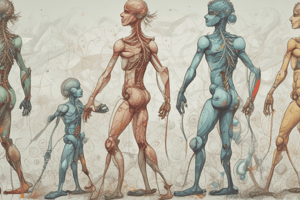Podcast
Questions and Answers
What is the primary source of genetic variation in populations according to the passage?
What is the primary source of genetic variation in populations according to the passage?
- Mutation (correct)
- Migration
- Recombination
- Random genetic drift
How does the passage describe the effect of selection on the frequency of a favored dominant allele?
How does the passage describe the effect of selection on the frequency of a favored dominant allele?
- The frequency is not affected by selection
- The frequency changes slowly if the allele is rare
- The frequency changes rapidly
- The frequency changes slowly if the allele is common (correct)
What is the main consequence of heterozygote superiority according to the passage?
What is the main consequence of heterozygote superiority according to the passage?
- The favored allele is maintained at high frequencies in the population (correct)
- The favored allele is quickly eliminated from the population
- The favored allele has no effect on the fitness of the organism
- The favored allele is only expressed in heterozygous individuals
How does the passage describe the effect of migration on allele frequencies in a population?
How does the passage describe the effect of migration on allele frequencies in a population?
According to the passage, what is the primary factor that prevents the elimination of harmful mutations from a population?
According to the passage, what is the primary factor that prevents the elimination of harmful mutations from a population?
Which of the following is NOT mentioned in the passage as a key process in population genetics?
Which of the following is NOT mentioned in the passage as a key process in population genetics?
Which of the following is a key ancestral process that shapes genetic variation?
Which of the following is a key ancestral process that shapes genetic variation?
What is the effect of genetic drift on allele frequencies over generations?
What is the effect of genetic drift on allele frequencies over generations?
How does genetic drift affect linkage disequilibrium (LD) between alleles?
How does genetic drift affect linkage disequilibrium (LD) between alleles?
What is the effect of genetic drift on heterozygosity in a population?
What is the effect of genetic drift on heterozygosity in a population?
How does population size affect the rate of genetic drift?
How does population size affect the rate of genetic drift?
Which of the following statements about genetic drift is true?
Which of the following statements about genetic drift is true?
Which of the following is NOT one of the conditions required for the Hardy-Weinberg principle to hold true?
Which of the following is NOT one of the conditions required for the Hardy-Weinberg principle to hold true?
Huntington's disease is an example of which type of genetic disorder?
Huntington's disease is an example of which type of genetic disorder?
What is the primary cause of genetic variation within a population?
What is the primary cause of genetic variation within a population?
In the Hardy-Weinberg principle, what does the letter 'p' represent?
In the Hardy-Weinberg principle, what does the letter 'p' represent?
Which of the following is NOT a consequence of violating the Hardy-Weinberg assumptions?
Which of the following is NOT a consequence of violating the Hardy-Weinberg assumptions?
What is the term used to describe the mating of individuals that are more closely related than expected by chance?
What is the term used to describe the mating of individuals that are more closely related than expected by chance?
In a population with two alleles, A and a, what is the frequency of heterozygous individuals (Aa) if the frequency of the dominant allele (A) is 0.6?
In a population with two alleles, A and a, what is the frequency of heterozygous individuals (Aa) if the frequency of the dominant allele (A) is 0.6?
Which of the following population genetic models assumes that populations are infinitely large and that migration, mutation, and selection do not occur?
Which of the following population genetic models assumes that populations are infinitely large and that migration, mutation, and selection do not occur?
What is the process by which new genetic combinations are generated through the exchange of genetic material between homologous chromosomes during meiosis?
What is the process by which new genetic combinations are generated through the exchange of genetic material between homologous chromosomes during meiosis?
Which of the following is NOT a force that can cause changes in allele frequencies within a population?
Which of the following is NOT a force that can cause changes in allele frequencies within a population?
Flashcards are hidden until you start studying




